Dogs are often playfully nicknamed the “furry vacuum” because they enjoy collecting food scraps that hit the floor. You’d think we never feel them! But while dogs are generally pretty robust creatures, there are still human foods that can be potentially harmful, resulting in anything from digestive problems to death. Dogs can have food allergies and be particularly susceptible to certain foods’ toxins, even if they may be healthy for us. You must be aware of what human foods your dog can and can’t eat to avoid giving your dog people food that could have dire consequences.
Can Dogs Eat Human Food?
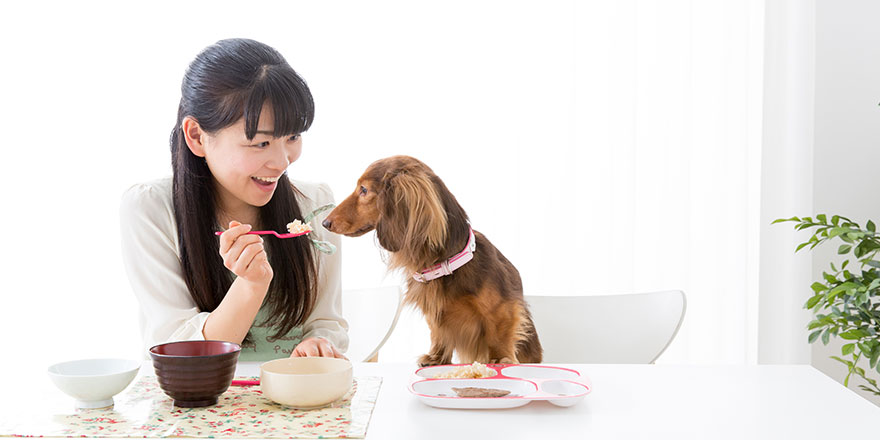
Yes and no. It depends entirely on the food you’re wanting to feed them. Dogs naturally can handle fruits, vegetables, and meat better than anything else as it’s the type of food they would look for in the wild. But even they have their restrictions, as certain fruits and veg are poisonous and potentially lethal. Just like certain plants, barriers and mushrooms are lethal to humans. If you can help it, it’s best to avoid giving your dog processed human food anyway, as their metabolisms are built for natural food such as meat (even raw meat) and vegetables, which provide a wide range of health benefits.
Just like humans, dogs can eat something that might trigger food allergies you didn’t know they had. Something can be perfectly safe for one person to eat, but it could cause mild to severe illness or even death for another. So keep that in mind when trying your dog out with new people foods.
We all know some dogs are incorrigible when it comes to getting hold of food they know they shouldn’t have. If you’ve got a pup just like that or one that finds the underside of the dining table particularly comfortable at mealtimes, this guide should come in handy.
What Should I Do If My Dog Eats Something They Shouldn’t?
Before we go any further, you should know what to do should your dog ingest something they shouldn’t have. This could potentially save their life or at least prevent a much worse reaction from happening:
Remove Whatever They Are Eating
Do whatever you can to remove that food from their mouth, and remove your dog from the area, so they’re not tempted to return to the crime scene. If you need to remove the food from their mouth, be mindful of their reaction. You don’t want to cause them unnecessary stress or to put yourself in danger. Be gentle, and try to coax the food from them in a reassuring manner. Shouting at them will only startle them and potentially cause them to reflexively swallow the food more quickly.
Watch For Food Poisoning Symptoms
The severity of their reaction will depend on how much they have eaten and what exactly they ate. It’s worth noting that they can take up to 12 hours to manifest themselves. So be sure to monitor them constantly in the 12-24 hours following eating whatever they got a hold of. Any of the following symptoms will be clear indicators that something isn’t right:
- Gagging or vomiting
- Shivering or shaking
- Difficulty breathing
- Coughing
- Lack of appetite
- Lethargy or muscle weakness
- Disinterest in interacting
- Irritability/standoffishness
- Diarrhea or constipation
- Changes in normal behavior
Call Your Veterinarian
A vet is the best person to take a look over your dog and determine the severity of their reaction. Call your veterinarian immediately to seek professional advice if you are concerned about your dog’s behavior or symptoms. If they are closed, contact the local emergency veterinary services. If you’re unable to get ahold of the emergency services and incapable of leaving the house, you can call the Pet Poison Hotline at 855-764-7661 or contact the Animal Poison Control line at (888) 426-4435.
*These hotlines do have a cost per minute, so be sure to check how much it will be so that you can ensure you will be able to afford the call and that you have your payment method to hand.
What Human Food CAN Dogs Eat
Nuts, Seed & Spices
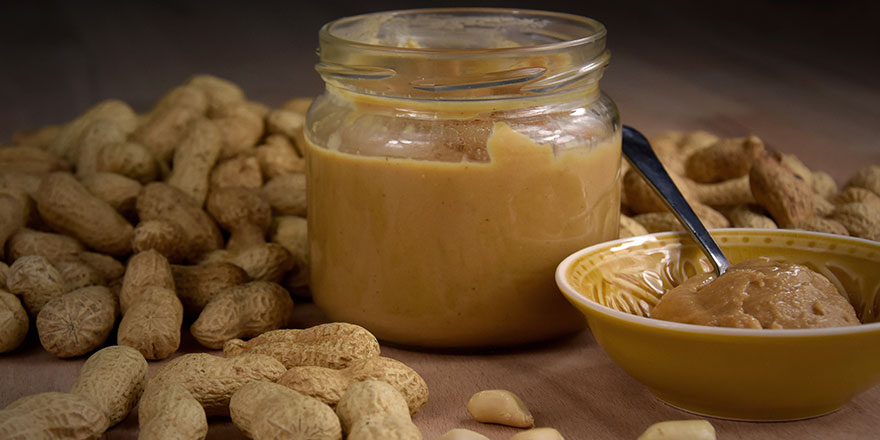
- Peanut Butter: Peanut butter is one of the better-known human foods suitable for dogs. Peanut butter doesn’t only make an excellent snack but can also be used to coax difficult dogs into taking their medication by sticking the tablet into a spoonful of peanut butter and letting your pooch lick it off. Just stick with unsalted peanut butter where possible, and never use one that contains macadamia nuts. Find out more about Dog Safe Peanut Butter Treats.
- Peanuts: To be clear – peanuts are absolutely fine. This does not include any other nuts, nor should you give your dog mixed nuts or flavored/salted peanuts. Especially salty foods are difficult for dogs to process, so stick to totally plain peanuts. Also, be mindful that they are naturally fatty, so use them in moderation. For a detailed explanation, check out Can Dogs Eat Peanuts.
- Quinoa: Quinoa is often used in high-quality dog food, so it is not toxic to dogs. This is another thing that maybe doesn’t make an excellent snack on its own. However, it can be used to top your dog’s dinner with something fresh and tasty. It is also a great alternative for wheat, soy, and corn.
- Wheat/Grains: Funnily enough, yes. Dogs can eat wheat and grains. There is a misconception that most dogs require grain-free diets. However, grain-free is only required for dogs that experience grain/wheat allergies. Grains offer protein and carbohydrates for energy and are fine for dogs to eat unless advised otherwise.
- Cashews: Cashews are just fine for dogs to eat and can provide a few health benefits, like a strengthened immune system and better recovery, thanks to magnesium, antioxidants, and protein. Though they are quite fatty, try not to feed your dog too many. And avoid salted cashews.
Proteins
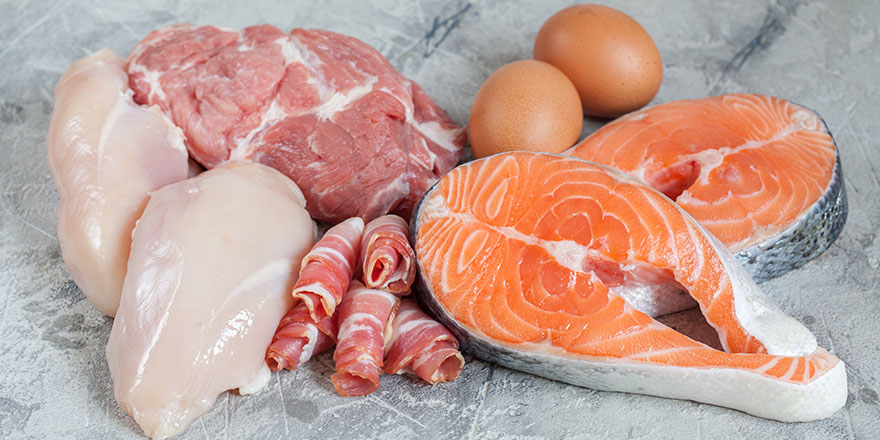
- Eggs: Dogs can eat both cooked eggs and raw eggs. When cooked, they can settle an upset stomach and are a great source of protein. Raw eggs help to support healthy skin and coats, though they also run the same risk of causing salmonella in dogs as in humans. So please calculate the risk before letting your dog have some.
- Pork: Pork is an extremely easy-to-digest protein. It contains lots of amino acids, which are known to help improve a bad mood. As well as being the least likely protein to cause an allergic reaction in pets that eat it. The only downside to pork is that it has the highest calorie per pound ratio.
- Salmon: So long as it is properly cooked throughout, salmon is extremely healthy for dogs. It’s high in protein, amino acids, and good fats, which promote healthy brain function, strong joints, and a boosted immune system. Just always ensure that it is cooked thoroughly before serving it up, as raw salmon can lead to salmon poisoning disease.
- Shrimp: Shrimp is absolutely fine for your dog. But just like any shellfish, it needs to be thoroughly cooked. You must also ensure you’ve removed the legs, tail, and head. It is a low-fat treat that provides plenty of phosphorus, B12, and antioxidants and is the perfect size for a quick treat.
- Tuna: Tuna is safe for dogs, as you can probably tell by the fact that it is often used in canine food recipes. However, it is carefully balanced in dog food formulas. If you’re giving your dog canned tuna, you should do so sparingly. It may be a fantastic source of omega 3, but the brine from the can contains mercury and sodium, which can upset your dog’s digestive system.
- Turkey: The chances are there has been turkey in your dog’s diet at some point in its life, as it is often used alongside other proteins in commercial pooch foods. So it is perfectly safe for dogs to eat. But don’t ever let your dog have cooked turkey containing bones, as it is extremely dangerous. Also, avoid feeding your dog raw meat turkey as a general rule.
- Chicken: Chicken, like turkey, is a staple in the canine food industry. Though it needs to be cooked, raw chicken can make your dog sick or cause digestive problems. When cooked thoroughly, it makes the ideal training treat. Simply chop the cooked chicken into chunks, ready to use as a tasty reward.
- Beef: Perhaps the best-known protein for dogs is beef. It contains plenty of iron, vitamins, and minerals to keep your dog strong and maintain overall health. Dogs can even enjoy raw meat! Ensure that you don’t use any seasoning on it, not even salt, as it can cause a negative reaction.
Dairy Products
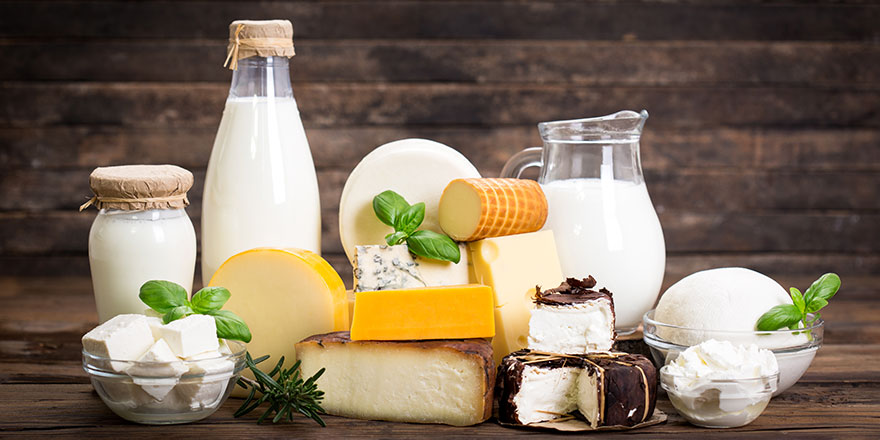
- Cheese: Though some dogs may have trouble digesting dairy products, they are not impossible for them to eat. The difficulty stems from lactose intolerant dogs rather than the fact that they are canines. So cheese shouldn’t be a problem. Though try and stick to low-fat to avoid unwanted weight gain. You can even get dog cheese for lactose intolerant pups.
- Milk: Another of many dairy products that dogs should have no issues consuming, provided they are not lactose intolerant (as intolerance can cause stomach pain). Though there’s no real need to feed your dog milk, it’s not forbidden and can be used as an occasional treat or change of pace.
- Plain Yogurt: Plain yogurt is quite safe for dogs and can help to strengthen your pup’s digestive system thanks to the active bacteria and probiotics inside it. Just be sure not to feed them any standard flavored yogurts, as they will not affect your dog’s blood sugar levels or teeth.
- Cottage Cheese: Cottage cheese is definitely the riskier dairy to give to your pup. They can eat it, but this particular food is also at higher risk of causing a reaction such as diarrhea or nausea. As a result, we’d suggest no more than a couple of spoonfuls a day at most.
Carbohydrates
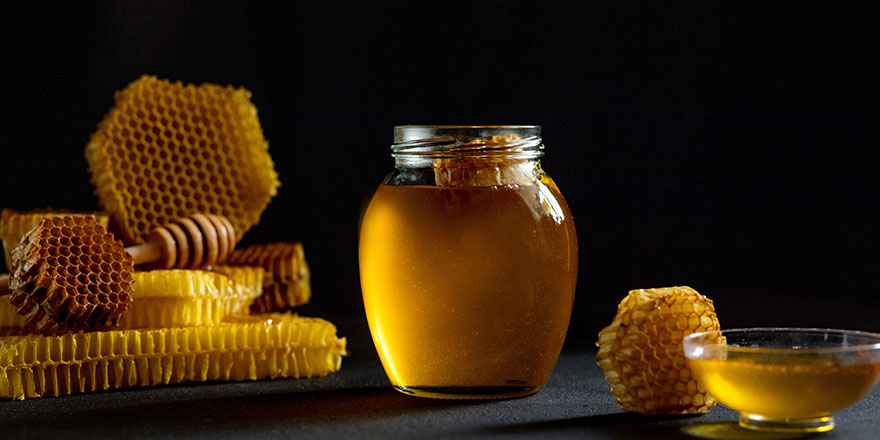
- Honey: Honey is chock full of vitamins and minerals for dogs to eat. Small amounts introduced into your dog’s diet can help to reduce seasonal allergies by bringing pollen into your pup’s system. It can also be applied to burns and superficial cuts as a topical treatment.
- Popcorn: Giving plain, unsalted, unflavored popcorn to dogs to eat provides them with thiamine, iron, protein, and riboflavin, which all help to maintain your pup’s eye health, strength, and digestion. Be very careful to remove any runaway corn kernels beforehand, as they can be a choking hazard.
- Oatmeal: Like all other people’s foods on this list, plain in key. Plain oatmeal gives your dog a healthy dose of fiber to maintain their digestive system while also topping them up with minerals and vitamins for healthy development. The real risk is weight gain, so feed your dog in moderation.
- Rice: Thoroughly cooked, plain brown or white rice is perfectly acceptable for dogs and can even help to alleviate stomach pain and digestive trouble. It can even be mixed with a simple, plain protein like chicken or turkey to settle your dog’s stomach during sickness or as an occasional treat.
What Human Food CAN’T Dogs Eat
Nuts, Seed & Spices
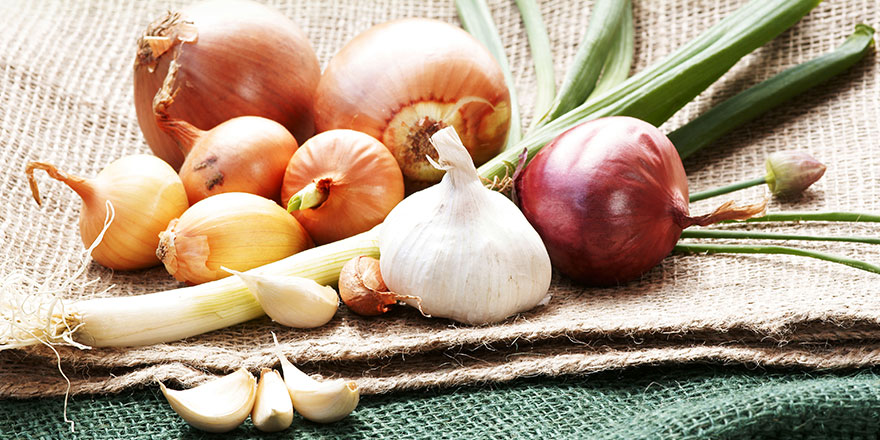
- Almonds: The major threat with almonds is the damage they can cause if your dog doesn’t chew or swallow its food properly. They can cause blockage of the esophagus, as well as potentially tearing ar the windpipe. Additionally, you should avoid feeding salted almonds to your dog as salt can be quite damaging in its own right.
- Cinnamon: Both the spice itself and the oils it contains can cause severe irritation to the inside of your pup’s mouth. This can result in sickness and stomach cramps. It can also cause low blood sugar, leading to severe reactions such as decreased heart rate and liver failure. Cinnamon dust can also cause respiratory problems. For more information on this topic, check out our in-depth article here.
- Garlic: Garlic is part of the Allium family, along with chives, onions, and leeks. However, garlic is particularly dangerous because it is five times more toxic than the others. It can be the cause of anemia as well as weakness, lethargy, cramping, and bloat, which is potentially lethal.
- Macadamia Nuts: You should be extremely careful never to let your dog eat macadamia nuts. Macadamia nuts are one of the most poisonous people foods you can give to your pup. Macadamia nuts can cause a fever, vomiting, extreme weakness, and even hurt the nervous system. Never feed your dog macadamia nuts.
- Nutmeg: Nutmeg contains a toxic compound that can cause increased heart rate, disorientation, dry mouth, high blood pressure, and even seizures. As a result, nutmeg, and food containing nutmeg, should never be left within reach of your dog, as the negative side effects are severe.
- Hops: Leaving a beer out where the dog can get to it can be easily done on a hot day. But you must keep it out of reach, as hops, a key ingredient in beer brewing, can be highly toxic to dogs. Should your dog consume hops, they could become severe, or potentially fatally, ill.
Proteins
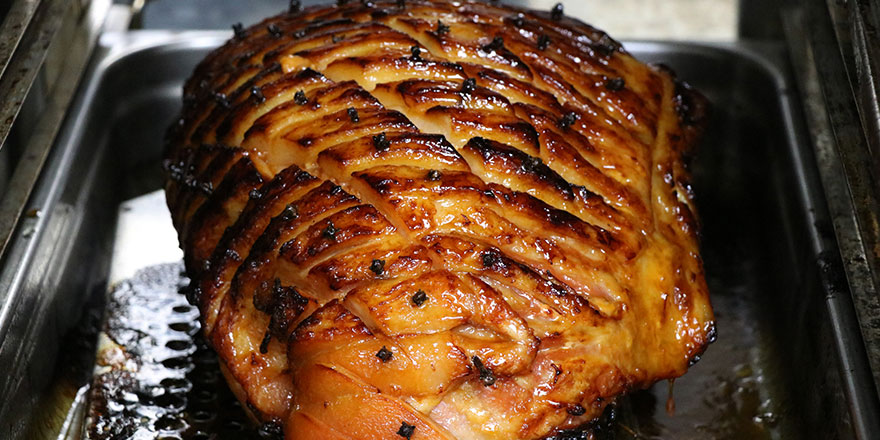
- Gammon: Gammon is extremely salty and fatty. Two things you don’t want to be giving your dog an excessive amount of. A lot of salt can lead to sodium ion poisoning, and too much fat can cause unhealthy weight gain. Small amounts are okay, but gammon should be avoided where possible.
- Ham: Ham shared very similar traits to gammon in that it is fatty and salty. Should your dog consume too much, the potential poisoning from too much salt can cause dehydration, confusion, convulsion, coma, or even death. Try sticking with the low-sodium meats for your pooch.
- Fat Trimming: Both cooked and uncooked fat trimmings are not ideal for your pup. Most dogs will enjoy being given fat trimmings as an occasional treat. But don’t make a habit, as too much fat can lead to pancreatitis, which causes severe diarrhea, dehydration, and stomach cramps.
- Liver: Most dogs are fine with living in small amounts. But you should avoid giving it to your dog too often, as the high amounts of vitamin A in the liver can tip the scales in the wrong direction and begin to cause adverse effects on your dog’s joints and result in gastrointestinal problems.
Dairy
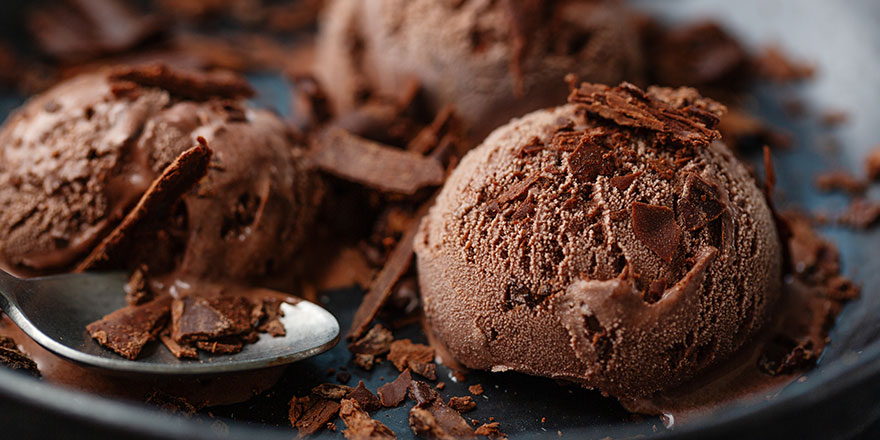
- Chocolate: Chocolate is probably one of the better-known human foods you should avoid feeding your dog. If your dog eats chocolate, you need to get them looked at by a vet immediately. The toxicity of chocolate can cause irregular heart function, seizures, or even death. So keep it well out of reach.
- Ice Cream: As refreshing as it may be in hot weather, there are other ways to cool your dog down than letting them have ice cream. It is relatively safe for dogs, but the sugar content can harm their dental health. Additionally, the dairy content could be problematic for lactose intolerant pups.
- Blue Cheese: If you’re going to let your dog have cheese, we’d suggest keeping away from blue cheese. Many dogs are sensitive to the substance produced by ripe blue cheese (Roquefortine C), which can make them quite ill. Additionally, you should avoid blue cheese with relatively high salt content.
Carbohydrates
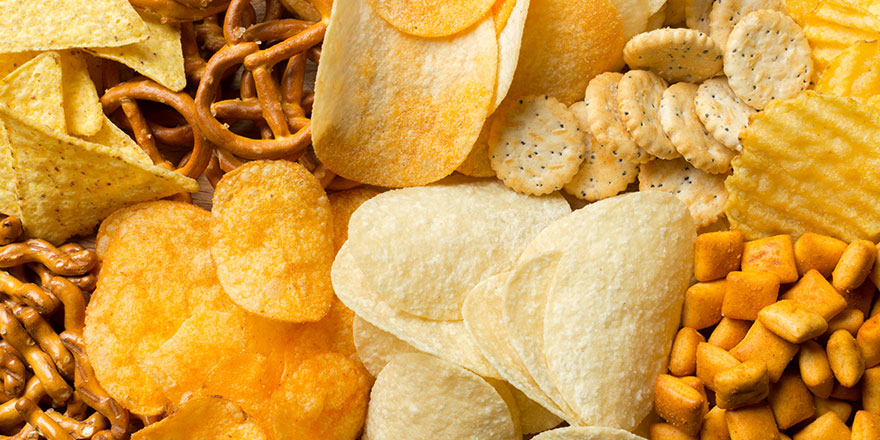
- Sugar: Any processed sugar should be avoided. Natural sugar is not so problematic. However, you’ll also want to keep the amount of high-sugar fruit you give your dog relatively low. Sugar can lead to dental problems, diabetes, and obesity. Problems are difficult and often expensive to rectify.
- Yeast: Yeast can expand in your dog’s stomach, causing excessive gas, bloating, and discomfort for your pup. Should your dog consume too much of anything that contains (or even raw yeast), it runs the risk of causing a rupture in its stomach or intestines, potentially fatal. Additionally, the release of ethanol from yeast into their bloodstream can lead to alcohol poisoning.
- Chips and Pretzels: Salty snack foods are a definite no for dogs. This includes chips, pretzels, salted popcorn, and salted nuts. Too much salt can cause serious damage to your dog’s body, leading to lifelong residual effects. Excessive salt can be fatal, so keep your dog away from snacks.
- Bread: If your dog eats bread, they do not gain anything from it. It doesn’t offer health benefits, nor does it have any nutritional value. So while a small amount of bread is okay for dogs, it doesn’t serve much purpose. If anything, it has the potential to give them a stomach ache and wind.
Other
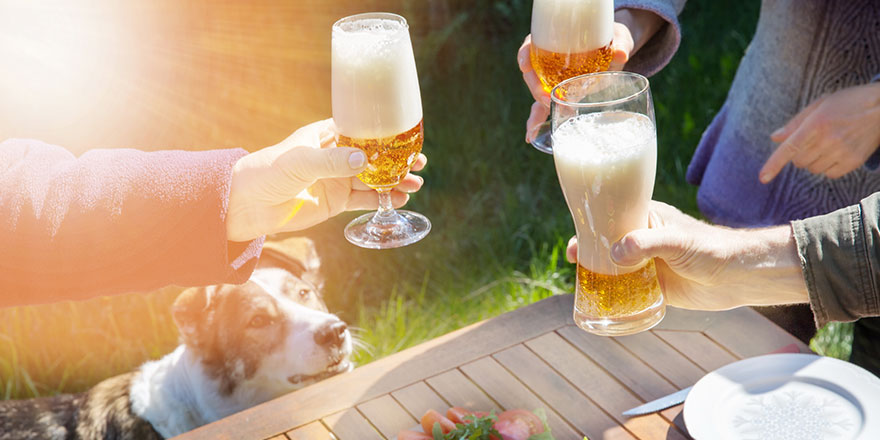
Alcohol: Never give your dog alcohol. Alcohol is a known poison, and ethanol poisoning in dogs can have severe side effects such as seizures, coma, heart attacks, respiratory failure, or could be fatal. This means keeping your dog away from alcoholic beverages and anything containing them.
Caffeine: Caffeine is a strong stimulant that should be avoided. Much like it does with humans, it can cause hyperactivity, headache, an elevated heart rate, tremors, respiratory problems, vomiting, diarrhea, and seizures. This goes for all caffeinated foods and beverages. So keep them away from your dog.
Tobacco: Nicotine, the core substance in tobacco, is lethal to dogs. It can invoke an abnormal heartbeat, tremors, fitting, vomiting, lethargy, and weakness. Tobacco poisoning is relatively fast-acting, and symptoms typically manifest within an hour of consumption.
Marijuana: THC, which is in marijuana, is a psychoactive chemical. Even small amounts of THC can be highly toxic for dogs. The symptoms include dribbling urine, irregular heart rate, slow responses, hyperactivity, lethargy, coma, and death. With marijuana becoming legal in more and more places, the danger of accidental marijuana consumption is growing.
Cooked Bones: If you’re giving your dog cooked meat, always ensure that every bone has been removed. Equally, never give your dog discarded cooked bones as they can splinter, causing serious damage to your dog’s mouth, throat, and digestive system. It also presents an extreme choking hazard should it get stuck on the way down.
Chewing Gum: Just as humans shouldn’t swallow it, neither should dogs. Gum is a serious hazard, with the possibility of your dog choking on it and the severe intestinal blockage it could cause. Constipation can affect your dog’s health, so keep gum far out of their reach.
Note: The advice provided in this post is intended for informational purposes and does not constitute medical advice regarding pets. For an accurate diagnosis of your pet's condition, please make an appointment with your vet.







